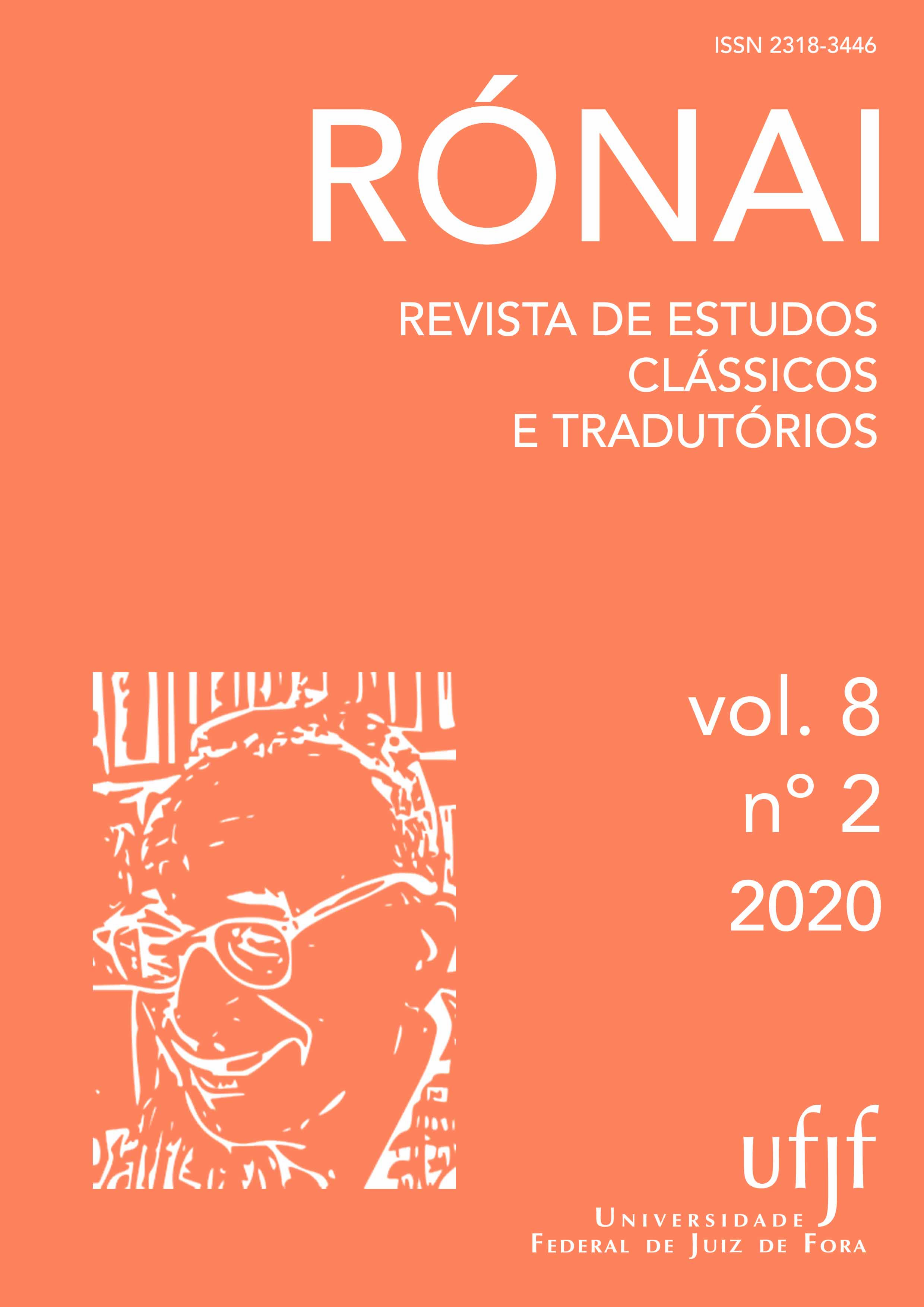Generic modulations in Virgil
DOI:
https://doi.org/10.34019/2318-3446.2020.v8.30899Keywords:
mixture of genres, modes, poetry, VirgilAbstract
In this article, grounded on the idea of “mode” (FOWLER, 1982, p.107), we analyze excerpts from Virgil’s poems in which generic mixing occurs. In Eclogues 6.31-81, the speech of Silenus displays some didactic (or epic) elements; in Georgics 3.8-39 and 3.322-338, epic and bucolic features could be found amidst their didacticism; finally, the Aeneid could be considered similar to a summary of several literary genres (HARRISON, 2007, p. 207 et seq.), including bucolic and didactic features (6.713-892). Thus, we intend to give examples that allow us to understand the variability of generic resources which Virgil employed in his own works. The data obtained point to the diffusion of the process of “modulation”, or partial generic mixing, over these three works of Virgil.
Downloads
References
APOSTOL, Ricardo Andres. Rome’s bucolic landscapes: place, prophecy and power in Aeneid VIII. 2009. 198 f. Tese (Doutorado em Filosofia – Estudos Clássicos) – Departamento de Estudos Clássicos da Universidade de Michigan, Ann Arbor, 2009.
CAIRNS, Francis. Virgil’s Augustan epic. Cambridge: Cambridge University Press, 1990.
CLAUSEN, Wendell. Commentary. In: VIRGIL. Eclogues. With an introduction and commentary by Wendell Clausen. Oxford: Clarendon Press, 2003, p. 29-328.
FEDELI, Paolo. Bucolica, lirica, elegia. In: MONTANARI, Franco (org.). La poesia latina: forme, autori, problemi. Roma: La Nuova Italia Scientifica, 1991, p. 77-131.
FOWLER, Alastair. Kinds of Literature: an introduction to the theory of genres and modes. Oxford: Clarendon Press, 1982.
GRIMAL, Pierre. Dicionário da mitologia grega e romana. Trad. Victor Jabouille. Rio de Janeiro: Bertrand Brasil, 2005.
GRIMAL, Pierre. Le lyrisme à Rome. Paris: Presses Universitaires de France, 1978.
HARRISON, S. J. Generic enrichment in Vergil and Horace. Oxford: Oxford University Press, 2007.
HASEGAWA, Alexandre Pinheiro. Os limites do gênero bucólico em Virgílio: um estudo das éclogas dramáticas. São Paulo: Humanitas, 2012.
HESÍODO. Os trabalhos e os dias. Trad. Christian Werner. São Paulo: Hedra, 2013.
HOMERO. Odisseia. Trad. Carlos Alberto Nunes. Rio de Janeiro: Nova Fronteira, 2015.
HORÁCIO. Epístola aos Pisões. Org. Júlia Avellar et alii. Belo Horizonte: FALE-UFMG, 2013.
JAEGER, Werner. Paideia: a formação do homem grego. Trad. Artur M. Parreira. São Paulo: Martins Fontes, 2003.
NÉRAUDEAU, Jean-Pierre. Sixième églogue. In: VIRGILE. Bucoliques. Texte établi et trad. par Eugène de Saint-Denis. Paris: Les Belles Lettres, 2002, p. 61-63.
OVIDE. L’art d’aimer. Texte établi et trad. par Henri Bornecque. Paris: Les Belles Lettres, 1960.
THOMAS, Richard F. Commentary. In: VIRGIL. Georgics – volume 2: books III-IV. Edited by Richard F. Thomas. Cambridge: Cambridge University Press, 1997, p. 36-256.
TOOHEY, Peter. Epic lessons: an introduction to ancient didactic poetry. London/New York: Routledge, 1996.
TREVIZAM, Matheus. Poesia didática: Virgílio, Ovídio e Lucrécio. Campinas: Unicamp, 2014.
VASCONCELLOS, Paulo Sérgio de. Efeitos intertextuais na Eneida de Virgílio. São Paulo: Humanitas, 2001.
VASCONCELLOS, Paulo Sérgio de. Épica I: Ênio e Virgílio. Campinas: Unicamp, 2014.
VIRGILE. Bucoliques. Texte établi et trad. par E. de Saint-Denis. Paris: Les Belles Lettres, 2002.
VIRGILE. Géorgiques. Texte établi et trad. par E. de Saint-Denis. Paris: Les Belles Lettres, 2014.
VIRGÍLIO. Eneida. Trad. Carlos Alberto Nunes, org. João Angelo Oliva Neto. São Paulo: Editora 34, 2016.
VOLK, Katharina. The poetics of Latin didactic: Lucretius, Vergil and Ovid. Oxford: Oxford University Press, 2002.
Downloads
Published
How to Cite
Issue
Section
License
Copyright (c) 2020 Matheus Trevizam

This work is licensed under a Creative Commons Attribution 4.0 International License.
Copyright
The authors of the published contributions agree with the following items:
1. The authors keep the copyright and convey to the journal the right of first publication, the work being licensed under a Creative Commons Attribution License 4.0 International.
2. The authors are allowed and stimulated to publicize and distribute their work online after the publication in the journal, recognizing first publication in this journal.
3. The authors of the approved works authorize the journal to distribute their content, after publication, for reproduction in content indexes, virtual libraries and similars.
For more information about Creative Commons Attribution License 4.0 International, please, go to: https://creativecommons.org/licenses/by/4.0/deed.en
Editorial exemption
The authors of the published contributions are entirely and exclusively responsible for their contents. Its content does not represent an official position of Rónai - Revista de Estudos Clássicos e Tradutórios neither of Faculdade de Letras da Universidade Federal de Juiz de Fora or their partner institutions.



